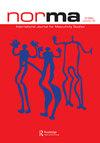Introduction: everyday bordering regimes and transitioning masculinities of racialized migrant men: a case study of the EU
IF 1.5
Q2 SOCIOLOGY
引用次数: 0
Abstract
The introduction to the Special Issue (SI) presents the collection’s theorization on the impact of everyday, micro-level borders that are propelled by discourses of Islamophobia, racism, and ethno-nationalism related to racialized migrant men’s masculinities in the European Union (EU). Along with the increased movement of racialized (Muslim) men to the EU’s shores have come crisis narratives about their otherness to b/order them. These borders operate in everyday encounters between migrant men and local communities as much as between groups of migrant men themselves, whether it is in the realm of livelihood strategies, romantic desires, assertions about sexuality and sexual identity, homosocial interactions, or friendships. This SI uses the frame of ‘transitions’ to interrogate how transitions in masculinities and masculine self-perceptions are shaped by b/ordering that is enacted every day and in the everyday against racialized migrant men. It argues that masculinized Islamophobia and masculine border(ing) thicken borders between these men and the natives to justify the men’s migrant (un)deservingness. The SI also brings into discussion strategies of masculine resistance and refusal that b/ordered men undertake through enactment and embodiment of caring masculinities or by their refusal to subscribe to norms of hegemonic masculinity.导言:日常边界制度和过渡的种族化移民男性的男子气概:欧盟的案例研究
特刊(SI)的引言介绍了该系列对日常微观层面边界影响的理论化,这些边界是由伊斯兰恐惧症、种族主义和与欧盟(EU)种族化移民男性阳刚之气相关的民族民族主义话语推动的。随着越来越多的种族化(穆斯林)男性涌向欧盟海岸,出现了关于他们的他者性的危机叙事。这些边界不仅存在于移民男性与当地社区之间的日常接触中,也存在于移民男性群体之间,无论是在生计策略、浪漫欲望、关于性和性身份的主张、同性恋社会互动还是友谊方面。本SI使用“过渡”的框架来询问男性气质和男性自我认知的过渡是如何被每天制定的b/秩序所塑造的,并且在日常生活中反对种族化的移民男性。它认为,男性化的伊斯兰恐惧症和男性化的边界扩大了这些男人和当地人之间的边界,从而证明了这些男人的移民(不)资格。SI还讨论了男性抵抗和拒绝的策略,即b/命令男性通过制定和体现关怀的男性气概或拒绝认同霸权男性气概的规范来承担。
本文章由计算机程序翻译,如有差异,请以英文原文为准。
求助全文
约1分钟内获得全文
求助全文
来源期刊

NORMA
Social Sciences-Gender Studies
CiteScore
3.00
自引率
14.30%
发文量
23
期刊介绍:
NORMA is an international journal for high quality research concerning masculinity in its many forms. This is an interdisciplinary journal concerning questions about the body, about social and textual practices, and about men and masculinities in social structures. We aim to advance theory and methods in this field. We hope to present new themes for critical studies of men and masculinities, and develop new approaches to ''intersections'' with race, sexuality, class and coloniality. We are eager to have conversations about the role of men and boys, and the place of masculinities, in achieving gender equality and social equality. The journal was begun in the Nordic region; we now strongly invite scholarly work from all parts of the world, as well as research about transnational relations and spaces. All submitted manuscripts are subject to initial appraisal by the Editors, and, if found suitable for further consideration, to peer review by independent, anonymous expert referees. All peer review is double blind and submission is online via Editorial Manager.
 求助内容:
求助内容: 应助结果提醒方式:
应助结果提醒方式:


